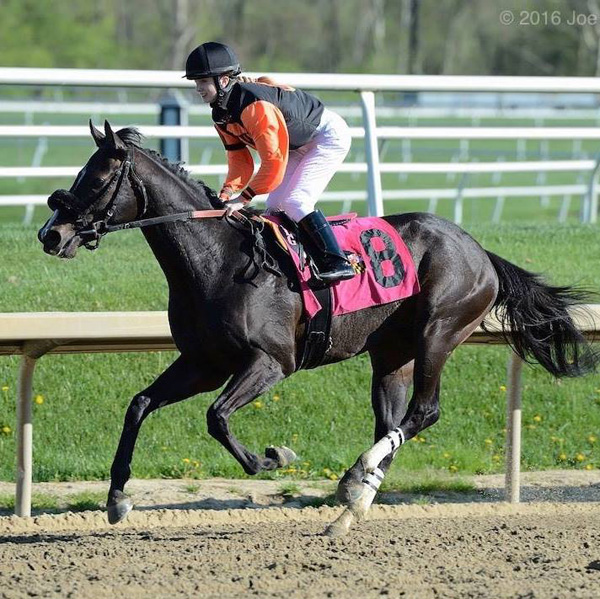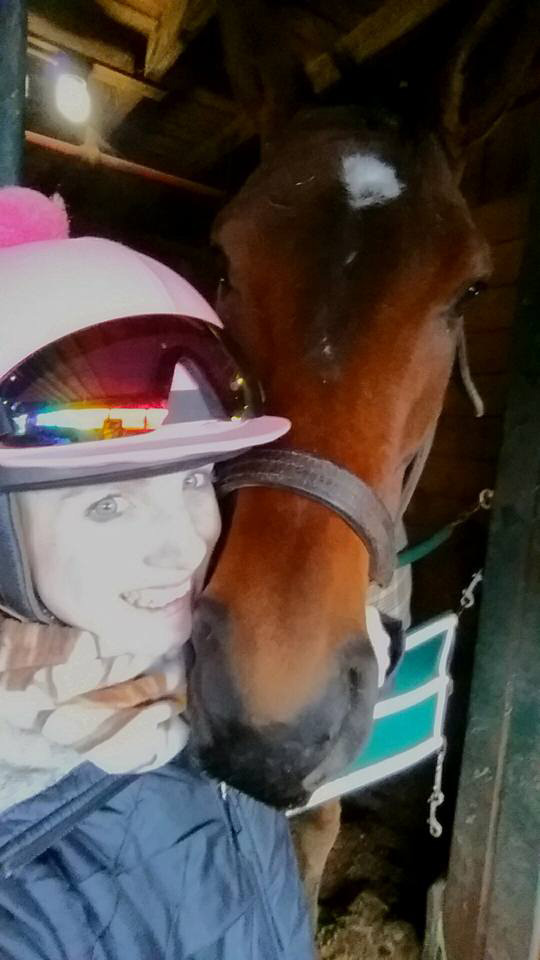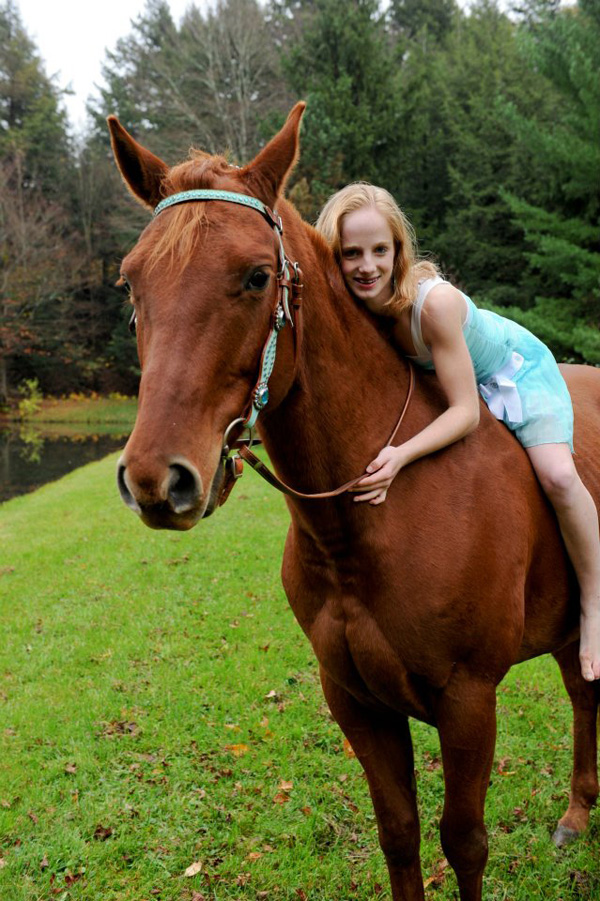





Lauralea Glaser
Lauralea Glaser is currently riding down at the MD area of racing and I fired off some questions for her to answer and here is what she said to them:
FOTH: Where were you born and where did you grow up?
LG: I grew up in a town called Bliss. Bliss, is a very small town in the country about 45 minutes outside Buffalo, NY.
FOTH: Did you come from a big family or small family? Have you lived in MD area all your live?
LG: My family consists of my Mother and Father and my two sisters; one older and one younger. I lived in Bliss my entire childhood. After I graduated high school, I moved to Kentucky for two years and then to Maryland.
FOTH: Were you always into horses or did that come later on? What did you want to be when you were growing up?
LG: I was always into horses. As far back as I can remember horses have been my passion. I never really had a plan on what I wanted to be when I grew up. I always thought it would be great to make a living with horses but I knew that trying to make a living in any horse business is very difficult.
FOTH: What did you think of horse racing the 1st time you saw a live horse race?
LG: I had seen horse racing on television quite a bit when I was younger. Any channel with horses was popular in a house full of horse loving girls. Honestly, I didn’t have a real calling to it initially. Thought it was pretty dangerous and didn’t know much about the industry. I didn't get to see a live horse race until I had already decided on becoming a jockey.
FOTH: So tell me about your 1st job on the race track and at that time did you know you wanted to become a jockey or did that come later on?
LG: I finally made the decision of try8ng to become a jockey about halfway through my senior year in high school. I could not convince myself of a college or a major that I had a passion for. All I wanted to do was work with horses. I came across an article about the North American Racing Academy, in Lexington, KY. It just made sense. I loved horses, I was athletic, and very small, and wasn't afraid of going fast. So I applied and was accepted. So my first job on the racetrack was taking classes at NARA. Grooming the school horses, mucking stalls and walking hots.
FOTH: How long did you gallop horses before you became a jockey and did anyone teach you how to ride?
LG: I learned how to gallop at NARA, which is a two year program. Hall of Fame jockey, Chris McCarron, was the lead instructor when I was there.
FOTH: Looking back was becoming a jockey easier or harder than you thought it would be?
LG: Becoming a jockey is difficult, but what I have learned from going through NARA and my own journey to becoming a jockey is that it's a different road for each individual. Everybody had their own obstacles to overcome, physical or mental. And everybody will hit a rough patch sooner or later. What really gets you through it is havin the perseverance to push through the tough patches. It gets really hard sometimes, but if you just keep going, you work really hard, and just keep learning it pays off in the end.
FOTH: Tell me about what you remember about your 1st race and do you remember what track it was at and where you finished?
LG: My first race was at Laurel Park. I was on a mare named Breezy Girl that I had been galloping consistently for a trainer Richard Sillaman. I was working for him before I made my start as a jockey. Rick wanted to give me my first mount and a jockey and named me on Breezy. It was a one turn mile on the dirt. I was pretty nervous but I think more excited. My instructions where that she could be a little keen early in the race and the best thing to do would be to tuck her in behind horses and she would settle for me. Then just wait and make a run at the end. One turn mile races at laurel go to the second wire which is a 1/16 further, which meant I had to be a little more patient when it came to timing my run. So we break from the gate well and I get her covered up and she is going pretty easy for me. About halfway down the backstretch horses started coming in tighter around me, and looking back now it wasn't that tight but I had never experienced being in a large group of horses that close together before, so I took a little bit more hold of her and she eased back a bit. By the time we got into the turn I was sitting last. I just waited, trying to be patient and as we turned for home I eased her out wide and asked her to run. She came flying up the outside and got up in perfect time for the win.
FOTH: Tell me about your 1st win. What track was that at and did you win by a lot? What was the feeling like getting your picture taken for the 1st time?
LG: I won on my first mount and I was so excited. We won by 3/4 of a length, in closing fashion. I remember Eddie, one of the outriders taking ahold of me after I pulled up. He knew how excited I was and wanted to give me a second to get myself together before he sent me on to the winner's circle. My entire family as well as some friends were there that day to watch my first race, so the winners circle was packed. And there were some happy tears.
FOTH: Did the jockeys get you good after the race and did you know it was coming?
LG: I had been told that there is an initiation ritual after you r first win and I knew to expect it after my first win, but with all of the excitement and adrenaline I had totally forgotten about it until it happened. I got buckets of ice water, a spraying hose and eggs, lots of eggs!
FOTH: What did your parents say when you told them you wanted to become a jockey and have they ever come seen you ride?
LG: My parents have always been incredibly supportive of my decision to become a jockey. I think at first it concerned them but I remember my dad telling me 'If I could think of a reason why you couldn't do it, or that you wouldn't be good at it then I wouldn't want you to do it, but I can't, so go for it' They visit as much as they can while still managing their jobs and my other siblings who are just as all over the place as I am.
FOTH: How long have you been riding for and how many tracks have you rode at so far in your career?
LG: I started racing in October 2014. It's been about a year and a half. So far I have ridden at:
Laurel, Pimlico, Timonium , Delaware , Penn National, Charles Town, Mountaineer, Presque Isle and the Sacramento California Fair Grounds
FOTH: Have you ever seen UK racetracks on TV and would you ever want to come ride a race in the UK one day?
LG: I have seen a bit of UK racing on TV and online. I was lucky enough to have the opportunity to intern in France at the end of my schooling at NARA. I went to a track in La Teste, near Bordeaux. I spent two months there learning how French stables are run, going to the races and how to gallop more European style. It was an amazing experience.
FOTH: What has been the hardest thing about being a jockey?
LG: The hardest thing for me personally is the social networking; talking to trainers and owners and going to all the barns. As crazy as that sounds, I am really not a people person by nature. I can ride horses all day long but working with people can be challenge. I have worked especially hard at this aspect because I know how important it is for being successful as a jockey. And I have gotten a lot better, but I do have to consistently work at it.
FOTH: Have you ever rode on Preakness day or the Black Eyed Susan Stakes day and if so what it is like riding on such big days with huge crowds?
LG: I have not ridden on Black Eyed Susan Day or Preakness day. I can only imagine the excitement of it all.
FOTH: At this time do you have any idea how long you would like to ride for?
LG: I would like to ride for as long as I am physically and mentally able. I don't see a reason to stop unless my body can't hold up or I get to the point where my heart isn't in it anymore. I don't know if the latter will ever happen but I understand how taxing this sport can become over time.
FOTH: Take me through a typical day.
LG; A typical race day for me is waking up about 4am, and getting to the racetrack about 5:30. I typically average between 6-10 horse a morning, to work or gallop. The most I have had in one morning was 14. Once I have finished the morning rides I head to the jocks room. There, depending on what time I finished and when my first race is I like to get a nap. Then I wake up from my nap and start my stretching, warming up, and looking at my program. Then I go through my races, and after the last one I get cleaned up and go home. Usually at this point it time for dinner, a little relax time and go to bed.
On a dark day, I will go through the same morning routine. I'll be finished by 10:30 and head home. Then I have the afternoon to relax. For me that usually entails playing with my dog or going out the farm to ride my horses.
FOTH: What are some things you like to do when you’re not doing horse related things?
LG: Pretty much everything for me is horse related. If I'm not at the track I'm usually out at the farm with my show horses. I just can't get enough of them.
FOTH: Have you ever had any injuries so far and does the thought of getting hurt cross your mind?
LG: I have been incredibly fortunate when it comes to horse related injuries. I have had serious injuries from non-horse related incidents that do occasionally give me a hard time, but are manageable. Getting hurt is always a possibility and I think as a rider you know and accept that fact every time you get on a horse, but it's when that though starts to consume your mind, and it's what you predominantly think about , that you have to take a step back. You can't ride scared.
FOTH: If some young girl came up to you and said she wanted to become a jockey, what would you tell her?
LG: I would tell her to get on a horse and ride as much as she can. Show horses, trail horses, just get saddle time. Get a good seat on a horse, and a good feel. Take lessons, and learn everything you can, from the ground up. Not just how to ride but everything about horses. How to care for them, how they move, how they think. Being a rider, whether it's a jockey or for show horses, it requires a partnership.
FOTH: So far have you had any problems with your weight and stuff?
LG: Luckily for me, watching my weight is not an issue. I am naturally light with a very high metabolism. I have to work to keep weight and muscle on so I don't have to put as much lead in my saddle.
FOTH: I am out of questions. Any last words to wrap this up?
LG: Thanks for the interview and good luck with the website.
Back to our main
page